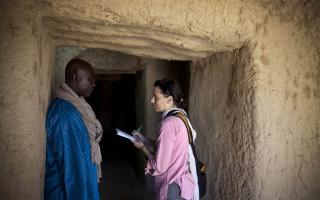UN System Innovation Springboard Programme
How do the most successful innovators implement more than their fair share of ideas? How do they unleash the creative talents of their teams? How do they move ideas throughout their organizations, ensuring they are relevant and systematically implemented, scaled, iterated, and tested?
Our eight-week Innovation Springboard Programme merges the development of key skills and insights for innovation, with the process and vision needed to engage in scaleable, relevant innovations. In this dynamic programme, you will learn to lead through self-knowledge and creativity, and enhance your impact through applicable tools and skills to contextualize; scope; strategize; design; implement and pitch your innovations.
The United Nations Secretary-General has made innovation a priority, highlighting the need for the organization as a whole to shift from “accidental” innovation to innovation “by design” in order to meet the challenges of our time.
This increasing priority is also reflected in the “UN 2.0 Policy Brief” Report, which aims at accelerating the transformation of the UN over the next five years through a "Quintet of Change" - focused on stronger capabilities for innovation, strategic foresight, behavioural science, data, and results.
Now, with the UN Innovation Toolkit providing actionable guidance on how to accelerate innovation across the UN System, there is a critical need for applied, peer-to-peer learning on innovation. The focus of this programme is to provide concrete skills, guidance and tools to make innovation replicable, sustainable, and embedded as a way of working and culture: to become simply, the way we do things.
Upon successful completion of the programme you will be able to:
- Discuss what innovation is, and the different types of innovation;
- Utilize the UN Innovation Toolkit; its diagnostic element; and the included UN customized tools to plan for, and facilitate, innovation;
- Discuss how key concrete skills can foster an enabling environment for innovation through modelling and promoting psychological safety; learning from failure; and fostering creativity;
- Understand how nudging and behavioural insights can further improve the tailoring of your innovations;
- Outline the key elements of design thinking, and apply these to the innovation process;
- Discuss how to design for testing and experimentation, to enhance innovation interventions through iteration and learning loops;
- Develop innovation storytelling and pitch capabilities/methodologies to improve communication and buy-in for innovation interventions;
- Explore how to develop a vision and a strategy for transition and change related to the implementation of your innovation efforts;
- Undertake coaching conversations with peers related to the scoping and design of innovations.
This programme provides a unique opportunity to reflect and work on a real innovation case that you will identify within your sphere of influence – this applied learning process is supported through live webinars, peer-coaching sessions, assignments with individualized feedback on your innovation case, relevant resources and materials. You will also have access to a moderated discussion forum to support, reflect and learn from your colleagues.
Innovation Project:
- Throughout the programme, you will identify a potential area of innovation within your own sphere of influence and, utilizing insights gained from the elements outlined below throughout the programme and the UN Innovation Toolkit, develop a project plan/pitch to be presented at the final peer-coaching session.
During the programme, you will engage in the following elements:
Webinar Sessions
- Immerse yourself in weekly two-hour Zoom webinars, spread across eight weeks, focusing mainly on the critical concepts of innovation; the key linkages between innovation and leadership; as well as contextualization, practice, and reflection exercises.
Individual Assignments
- Scope your innovation case and get personalized feedback from expert innovation coaches on two assignments.
Peer-Coaching Sessions
- Practice your coaching skills through four, two-hour peer coaching sessions and work on your innovation case with the expert innovation coaches’ guidance.
Resources
- Get weekly pre-readings and materials to introduce and outline key concepts and processes.
Online Discussion Forum
- Engage in a moderated space for reflection, where you will be given a tool relevant to the theme of the week, for you to share your experience on its use with the rest of your peers.
Optional Self-paced Modules
- Take advantage of the UNSSC-designed Blue Line self-paced learning platform, with an optional to take an innovation-themed learning pathway during the programme. Topics include:
- Introduction to Innovation; and
- Introduction to Change Management.
Upon completion of the above, you will have successfully completed the programme, receive a certificate and have unlimited access to a curated online UNSSC e-lounge learning platform.
In this programme, you will be exposed to the following content:
Week 1: Introduction and Orientation
- Get to know the programme, your resource persons and peers!
Week 2: Innovation and the UN Innovation Toolkit
- Outline innovation and its differing types in your context;
- Understand the UN Innovation Toolkit: 21 tools, worksheets, and case studies;
- Identify your readiness to innovate through an assessment;
Week 3: Creating an Enabling Environment
- Examine psychological safety to drive innovation;
- Cultivate a learning-from-failure culture;
- Learn how to encourage creativity;
Week 4: Behavioural Insights (UNSSC Innovation Model I)
- Identify which specific behavioural outcome you’re designing for;
- Apply behavioural insights to define actions that may influence the uptake of your innovation;
Week 5: Design Thinking (UNSSC Innovation Model II)
- Ensure solutions are being developing to reflect the needs of end-users;
- Explore idea sourcing techniques;
Week 6: Test and Experiment Design (UNSSC Innovation Model III)
- Analyse how to design and run experiments or research for learning loops;
- Explore how to frame your experiments and research as questions;
Week 7: Innovation Storytelling and Pitch (UNSSC Innovation Model IV)
- Select the right types of communication approaches for various stakeholders to gain buy-in and make more strategic decisions;
Week 8: Embracing Transition and Change for Innovation
- Outline the processes and potential challenges of transition and change when implementing an innovation;
- Discuss types of resistance, how it shows up and why, and what you may be able to do to reduce it.
All UN personnel at headquarters and field locations who are engaged on innovation or would like to deepen their knowledge on the topic.
This course is available for self-enrollment, or for groups nominated by a UN entity at a different price.
The Programme costs $2,500. The tuition covers:
• Preliminary Phase
- Learning Needs Assessment to customize the programme to your needs.
• Core Programme Phase
- Eight interactive webinar sessions with expert instructors;
- Four peer-coaching sessions to enhance your coaching skills and build your innovation case;
- Two innovation assignments on your innovation case, with individualized feedback;
- A curated moderated online forum to reflect on the learnings from the webinars;
- Readings and resource material that outline key concepts to refer to during and after the programme;
- Optional self-paced modules;
- Unlimited access to a curated online UNSSC e-lounge learning platform.
- Certificate of Completion.





